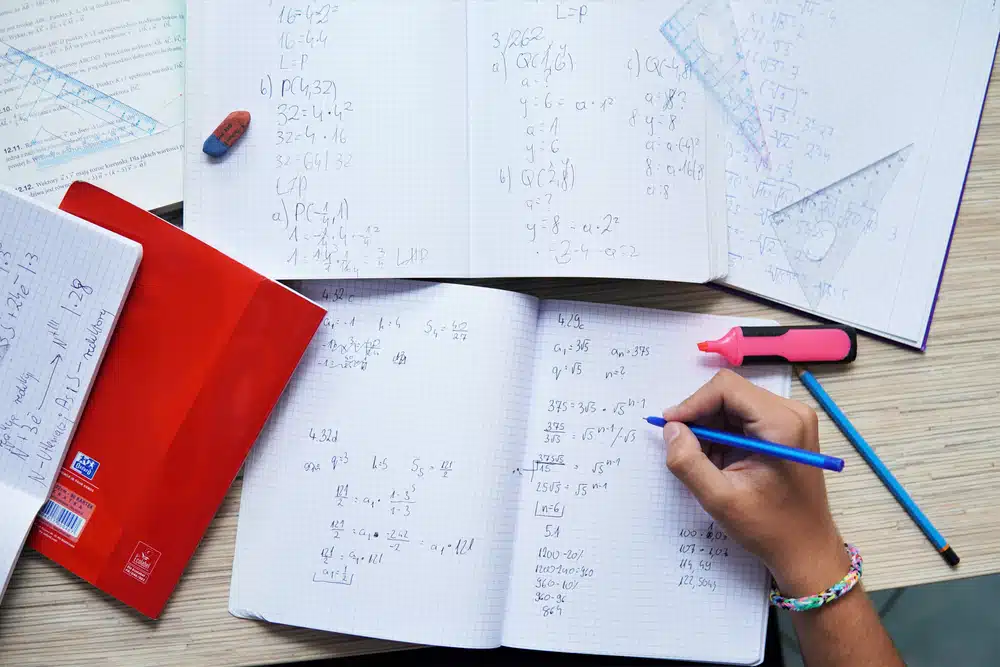Top 20 Applied Math Programs for High School Students
If you’re a high school student looking to boost your math skills, consider diving into Applied Math Programs. These programs mix theory with hands-on practice, equipping you with the skills to tackle complex problems in various fields. In this blog, we will discuss the choices of applied math programs for high school students you might consider this summer!
Top 20 Applied Math Programs for High School Students
1. Joaquin Bustoz Math-Science Honors Program
- Location: Arizona State University
- Estimated Cost: FREE
- Eligibility: High school sophomore, junior or senior
- Important Dates: February 18, 2024 (Application Deadline)
The Joaquin Bustoz Math-Science Honors Program (JBMSHP) serves motivated students with a keen interest in mathematics, science, or engineering, particularly those from underrepresented groups in these fields. The program offers participants the opportunity to reside on the Arizona State University (ASU) Tempe campus and engage in university-level mathematics courses, earning three college credits.
Students attend classes daily, engage with rigorous homework and exams, and benefit from tutoring sessions. The program provides essential insights into college life and academic success strategies to facilitate a smooth transition to higher education.
JBMSHP gives special attention to first-generation college-bound students, individuals from underrepresented groups in STEM, and those representing diverse backgrounds from across Arizona, including rural areas and Native Nations.
2. MathQuantum Summer Research
- Location: UMD College Park campus
- Estimated Cost: $5,200
- Eligibility: High school, undergraduate, graduate
- Important Dates: Spring 2024 deadline: December 8th, 2023, Summer 2024 deadline: February 16th, 2024
The program is designed to bridge the gap in skills and knowledge necessary for interdisciplinary research between mathematics and quantum information science (QIS). It provides fellows with comprehensive support to enhance their expertise in this niche area.
Participants receive mentored research experience and interdisciplinary training, focusing on the application of mathematical methods to QIS challenges. The program includes coursework and seminars in both theoretical and applied mathematics tailored for QIS. Fellows also gain access to internship opportunities at leading quantum companies and government laboratories, enriching their practical experience in the field.
Professional development is a key component, with networking events, workshops on broader impacts, and proposal writing included in the program. Fellows benefit from personalized career mentoring and guidance, ensuring they are well-prepared for their future careers. Furthermore, the program develops a sense of community through outreach activities, promoting engagement and collaboration among participants.
3. College of Engineering Math Academy
- Location: UW Seattle campus
- Estimated Cost: Free
- Eligibility: Grades 10-11
- Important Dates: July 22 – July 26, 2024
The Engineering Academy offers a five-day introductory experience to engineering for high school students from the greater Seattle area. During the program, participants will take part in hands-on design challenges, allowing them to directly engage with engineering concepts and practices.
The academy facilitates interaction with engineering students and faculty, providing valuable insights and fostering connections in the engineering community. Participants will also have the opportunity to discover the diverse fields within engineering and understand the significant impact these disciplines have on society and the world.
4. PZMC – PZ Number Theory Camp
- Location: Williams College
- Estimated Cost: $2,700
- Eligibility: High school students
- Important Dates: Apr 26, 2024 (Application Deadline), July 1-12 (Camp Dates)
PZMC, formerly known as Williams College Math Camp (WCMC), upholds its tradition with the original team, location, and educational content. This camp caters to approximately 25 high school students who show a strong aptitude in mathematics and have either completed or are enrolled in Algebra 2 or its equivalent.
At PZMC, students dig into various mathematical areas, particularly focusing on Number Theory and the art of mathematical reasoning. They engage deeply with numerical theories, posing significant questions, identifying patterns, and developing proofs. The camp features interactive lectures, collaborative problem-solving, and final project presentations, providing a comprehensive learning experience.
- Location: Bard College
- Estimated Cost: $475
- Eligibility: Grades 6–9
- Important Dates: Apr 30, 2024 (Application Deadline)
Entering its 11th year in 2024, the Bard Math CAMP (Creative and Analytical Math Program) offers a unique learning experience for students. This day camp is perfect for those with a solid understanding of school mathematics and a curiosity for exploring beyond the standard curriculum in a laid-back environment.
Bard Math CAMP is a hub for mathematical enrichment, where experienced educators and undergraduate math majors lead stimulating classes and activities. The program prioritizes hands-on math, teamwork, innovative thinking, and creative problem-solving. It’s an ideal place for students who enjoy experimenting, tackling puzzles, and linking math with art and computer science.
The camp has earned recognition from the American Mathematical Society with three Epsilon Awards and received support from the Mathematical Association of America through Dolciani Math Enrichment Grants during its initial years.
6. Della Pietra High School Applied Math Program
- Location: Stony Brook University
- Estimated Cost: $450
- Eligibility: High school freshmen or above
- Important Dates: Spring Semester 2024: February 10, 24, March 2, 9 and 16
During the semester, students immerse themselves in applied mathematics, exploring areas such as game theory, optimization, and the intriguing mathematics behind puzzles and games. They also venture into computer modeling and get a primer on financial mathematics. Beyond these theoretical aspects, the program emphasizes practical skill development, particularly in using EXCEL and/or MAPLE.
These software tools are pivotal for anyone aiming to excel in Business, Mathematics, Physics, Engineering, or Economics at the college level or in professional settings. The program is meticulously crafted to bolster high school students’ problem-solving skills and technical acumen in applied mathematics.
7. The Hampshire College Summer Studies in Mathematics
- Location: Hampshire College
- Estimated Cost: $5, 882
- Eligibility: High school students
- Important Dates: June 30th – August 10th, 2024
The Hampshire College Summer Studies in Mathematics (HCSSiM) offers a rigorous six-week program where talented and highly motivated high school students experience college-level mathematics. This intensive program emphasizes active engagement in mathematics rather than just learning its results.
Each day, participants engage in four hours of morning classes from Monday to Saturday, tackle the pre-supper Prime Time Theorem, and participate in evening problem sessions. Afternoons are reserved for reading, rest, recreation, occasional town trips, and informal study, balancing academic rigor with well-being and social activities.
Students benefit from exceptional access to faculty members, not only in classrooms but also during meals and within the residential setting of the program. This close interaction fosters productive collaborations that often extend beyond the program’s duration, with many participants forming lifelong friendships. The HCSSiM experience is both demanding and expansive, offering a unique blend of rigorous academic challenge and community building.
- Location: University of Puget Sound
- Estimated Cost: $5,500
- Eligibility: Ages 13 and 18
- Important Dates: June 30 – August 4, 2024
The Canada/USA Mathcamp is an intensive five-week summer program tailored for mathematically gifted high school students. It aims to reveal the elegance of advanced mathematical concepts and foster innovative thinking. Beyond a traditional summer camp, Mathcamp constitutes a dynamic community united by a shared enthusiasm for learning and a deep passion for mathematics.
At Mathcamp, participants delve into topics typically reserved for undergraduate and graduate studies, enhancing their problem-solving abilities. These skills are invaluable, equipping students for success in any academic or professional path they pursue. The program’s vibrant environment encourages exploration and discovery, making it an enriching experience for young mathematicians.
9. UC Merced’s Applied Math Challenge for High School Students
- Location: University of California, Merced
- Estimated Cost: Not Specified
- Eligibility: High School Students
- Important Dates: July 25 – August 5, 2024
UC Merced’s Annual Applied Math Challenge for High School Students will engage local high school students in a two-week mathematical challenge. Here, they will work in teams, guided by a UC Merced graduate student mentor. The mentor’s role is to help participants grasp fundamental mathematical concepts as they develop a poster presentation detailing their methods and solutions to a real-world problem.
Upon completing their projects, students are invited to UC Merced on August 5th to showcase their work in a poster session. This event also provides a unique opportunity for the participants to interact with the UC Merced Applied Math faculty and undergraduate students, enriching their experience and offering a glimpse into the academic community.
10. All Girls/All Math (AGAM) Cryptography Camp
- Location: University of Nebraska–Lincoln
- Estimated Cost: $625
- Eligibility: Grades 10-12
- Important Dates: June 9-14, 2024 (Program Dates)
This program explores the practical applications of mathematics in real-world scenarios, particularly focusing on RSA encryption, a method widely used for securing online transactions. Participants will unravel the mathematics that enable the sending and deciphering of secret messages. They will also have the opportunity to interact with distinguished speakers from various mathematical professions, all while enjoying a dynamic and engaging learning environment.
Designed for students entering grades 10-12 who have completed high school geometry, the camp places a special emphasis on those approaching their sophomore or junior years and have not yet studied Calculus. The program encourages applications from all interested students, with particular attention to those from underrepresented groups in STEM fields.
11. Program in Mathematics for Young Scientists (PROMYS)
- Location: Boston, MA
- Estimated Cost: $6,100
- Eligibility: At least 14 years old
- Important Dates: June 30 – August 10, 2024 (Program Dates)
PROMYS offers a rich environment for mathematical discovery, particularly in the field of Number Theory. First-year participants primarily focus on solving complex Number Theory problems. They are tasked with creating numerical experiments and utilizing their analytical skills to identify patterns, test conjectures, and develop their mathematical proofs.
For returning students and motivated first-year attendees, PROMYS provides Advanced Seminars on a range of topics. These seminars, led by PROMYS faculty and visiting mathematicians, occur two to three times weekly and include both lectures and challenging problem sets.
12. Stanford University Mathematics Camp (SUMaC)
- Location: Stanford University
- Estimated Cost: $3,550 (Online), $8,250 (Residential)
- Eligibility: Grades 10-11
- Important Dates: June 17, 2024 – July 5, 2024 (Online), June 23, 2024 – July 19, 2024 (Residential), July 8, 2024 – July 26, 2024 (Online)
SUMaC offers an immersive experience in advanced mathematics, guiding participants through lectures, guided research, and collaborative problem-solving in a math-focused environment. The program explores the latest mathematical research, the historical evolution of significant mathematical fields, and their applications in various scientific disciplines.
SUMaC caters to students with a profound interest in mathematics, ready to tackle subjects like abstract algebra, number theory, or algebraic topology. The curriculum is designed for intellectual enrichment, focusing on pure mathematics beyond standard classroom topics. Although the courses are not for credit, they provide a comprehensive and intensive exploration of advanced mathematical concepts.
- Location: Online
- Estimated Cost: Free
- Eligibility: Grades 7 – 10
- Important Dates: TBD
The GirlsxMRO summer program operates via Zoom and Discord, targeting girls and non-binary students with an introduction to advanced math topics such as Algebraic Combinatorics, Abstract Algebra, and Set Theory/Topology. These subjects form the backbone of entire mathematical fields and research areas, yet they are seldom covered in typical classrooms or math competitions.
The program aims to cover a vast amount of theory and to provide participants with an insight into the broader landscape of advanced mathematics, encouraging them to explore these topics further on their own.
Live Zoom sessions offer an initial overview of the weekly topic, while subsequent reading groups allow students to delve deeper into the subject matter. This format is crucial in GirlsxMRO’s approach, as reading and understanding advanced mathematical texts is essential for success in higher-level math studies and research. Through this structured yet exploratory approach, the program equips students with the foundational skills necessary for advanced mathematical learning and research.
14. Summer Academy for Math and Science
- Location: Carnegie Mellon University
- Estimated Cost: Free
- Eligibility: At least 16 years old
- Important Dates: Jun. 22 – Aug. 3, 2024 (Program Dates)
The Summer Academy for Math and Science (SAMS) provides an intensive educational journey, where students are immersed in a challenging curriculum under the guidance of distinguished faculty and staff committed to their success.
SAMS is structured to nurture future leaders in STEM, focusing on preparing students to excel in top-tier universities and commit to STEM-related disciplines. It provides an enriching environment that broadens students’ perspectives and access to opportunities in STEM fields, equipping them with the essential knowledge and skills for success.
The program unfolds in two phases: a virtual jumpstart session to hone necessary skills followed by an immersive six-week in-person experience, culminating in a symposium that highlights the student’s academic and research accomplishments. Through this comprehensive approach, SAMS plays a pivotal role in shaping the next generation of STEM innovators and scholars.
15. California State Summer School for Mathematics & Science (COSMOS)
- Location: University of California
- Estimated Cost: Grades 8-12
- Eligibility: High school students in California ONLY
- Important Dates: February 9, 2024 (Application Deadline)
The California State Summer School for Mathematics and Science (COSMOS) is an intensive four-week summer residential program designed for high school students who show a keen interest and aptitude in science, technology, engineering, and mathematics (STEM) subjects. This program is for talented and driven high school students, providing them with a unique opportunity to engage with leading faculty, researchers, and scientists in cutting-edge facilities in learning math.
- Location: Online
- Estimated Cost: Not Specified
- Eligibility: High school juniors and sophomores
- Important Dates: Year Long
In 2024, MIT PRIMES will offer research projects across mathematics, computer science, bioinformatics, and computational biology, engaging students in cutting-edge research and collaborative learning.
Mathematics: The program features 20 local students engaged in six research projects, complemented by five reading groups. Additionally, the national PRIMES-USA Math section includes 44 students working on 27 research projects, both individual and joint. These mathematics projects, suggested by faculty and researchers from prestigious institutions, cover areas like combinatorics, algebra, and number theory.
Computer Science: This section involves 23 students in 19 research projects, ranging from individual to joint efforts. The projects, proposed by faculty from renowned centers, span vital areas such as data protection, natural language processing, and robotics.
Bioinformatics and Computational Biology: Nine students are each working on individual research projects in this section, with topics proposed by leading labs and institutes, focusing on the intersection of biology and computational sciences.
17. Math ExpLR: Summer Research Program for High School Students
- Location: UC Irvine
- Estimated Cost: Free
- Eligibility: High school students
- Important Dates: June 17, 2024 – July 25, 2024 (Program Dates)
In this six-week program, participants will engage in computational biology research, working in small teams under the guidance of a Principal Investigator (PI). The program includes intensive workshops designed to equip students with essential research skills. These workshops cover a range of topics, including Matlab programming, mathematical modeling, delivering research presentations, and crafting research papers. This comprehensive approach ensures that students are well-prepared to conduct research effectively.
18. Rutgers Young Scholars Program in Discrete Mathematics
- Location: Rutgers University (Busch campus)
- Estimated Cost: $4,500
- Eligibility: High school students
- Important Dates: July 8 – August 2, 2024
The Rutgers Young Scholars Program in Discrete Mathematics is a summer initiative for mathematically talented high school students who show a keen interest in mathematics. This program aims to develop a mathematically stimulating environment, encouraging participants to pursue careers in the mathematical sciences.
Selected students will be immersed in an intensive four-week residential academic experience, offering a rigorous introduction to discrete mathematics. This area of study, significant for its applications in cutting-edge research, provides the foundation for the program’s curriculum.
Participants will hone their problem-solving skills through the practical application of mathematical theories to diverse problems. They will interact with distinguished discrete mathematics professionals, gaining insights into the field and potential career paths. Mentoring and academic support will be provided by teaching assistants, who are themselves advancing in mathematical careers, enriching the program’s learning environment.
19. Simons Summer Research Program
- Location: Stony Brook University
- Estimated Cost: Free
- Eligibility: Must be at least 16 years old
- Important Dates: July 1, 2024 – August 9, 2024 (Program Dates)
Established in 1984, the Simons Summer Research program serves as an outreach initiative for local high school students. Over the years, it has expanded its reach to attract applicants nationwide to the Stony Brook campus. Participants in this program, known as Simons Fellows, are paired with mentors from Stony Brook faculty. They become integral members of research groups or teams and take ownership of a designated project.
Throughout their apprenticeship, Simons Fellows gain valuable knowledge of research techniques and immerse themselves in the vibrant atmosphere of a major research university. They attend weekly faculty research talks, engage in special workshops, tours, and events, and actively contribute to the academic community. As a culmination of their experience, Simons Fellows present their research findings through a written research abstract and a research poster at the closing poster symposium.
Moreover, Simons Fellows receive a stipend award as recognition of their dedication and contributions to the program. This comprehensive experience not only fosters academic growth but also provides a rich environment for personal and professional development.
- Location: Washington, DC
- Estimated Cost: Not Specified
- Eligibility: High school students
- Important Dates: TBD
The program’s goal is to inspire students to explore STEM fields by demonstrating how mathematics plays a crucial role in these areas and by providing insights into potential careers.
Participants will study a range of topics, including cryptology, game theory, data science and statistics, number theory, and graph theory. They explore the evolution of cryptographic methods and their importance in cybersecurity, discover how decision-making theories are applicable in daily life, learn about data analysis and statistical techniques, understand the foundational principles of computer security through number theory, and explore the applications of graph theory in securing physical spaces and creating social networks.
The program goes beyond classroom learning by incorporating immersive field trips to places where mathematics is actively used. These trips provide students with firsthand exposure to real-world applications of mathematics and opportunities to interact with peers and undergraduate students who share similar interests. Through interactive learning experiences and hands-on activities of this program, high school students gain a deeper understanding of how mathematics is applied in different contexts.
By blending theoretical knowledge with practical experiences and real-world applications, “Applied Math in Action!” aims to inspire high school students and equip them with the skills and enthusiasm needed to pursue mathematics as a foundation for future studies and careers in STEM disciplines.
How to Find the Best Applied Math Programs for You?
Finding the applied mathematics programs that align with your academic goals and career aspirations involves careful research and consideration. Here’s how to find the applied math programs for high school students like you:
Define Your Goals and Interests
Before you start your search, clearly define what you want to achieve with your degree in applied mathematics. Are you interested in theoretical research, or do you prefer practical applications, such as engineering or data science? Your career goals will significantly influence the type of program that suits you best.
Research Program Rankings and Reputation
Look into rankings of applied mathematics programs to get an initial sense of which universities are well-regarded in the field. However, don’t rely solely on rankings. Consider the reputation of the programs in areas that specifically interest you, such as computational mathematics, statistics, or operations research.
Investigate Faculty and Research Opportunities
The quality of the faculty and the research opportunities available are crucial factors. Explore the faculty profiles on university websites to see their research interests, publications, and projects. An applied math program with faculty actively engaged in areas you are passionate about will offer you more opportunities for mentorship and research.
Consider Program Curriculum and Specializations
Applied math programs may have varied curricular focuses. Look at the course listings and program requirements to see which ones align with your interests and goals. Some programs might offer specializations or tracks in areas like financial mathematics, applied statistics, or computational biology, which could be beneficial for your career path.
Evaluate Location and Resources
The location of the university can also be significant. Consider whether you prefer an urban or rural setting, proximity to industry hubs, or access to specific laboratories or resources. Think about the support services offered, such as career counseling, internships, and networking opportunities.
Check Admission Requirements and Financial Aid
Make sure you meet the admission requirements for the programs you’re interested in. Also, investigate the availability of financial aid, scholarships, and assistantships, which can play a big part in your decision-making process, especially if you are looking at prestigious applied math high school summer programs.
Attend Open Days and Reach Out to Current Students or Alumni
If possible, visit the campuses to get a feel for the environment and culture. Many universities offer open days or virtual tours. Try to connect with current students or alumni to hear about their experiences and get insider perspectives on the program’s strengths and weaknesses.
Look at Post-Graduation Success
Finally, consider the success of the program’s graduates. Look at employment rates, typical career paths, and whether the program has a strong network of alumni. Programs that have a good track record of placing students in desirable jobs or Ph.D. programs can indicate a high-quality education and strong industry or academic connections.
How Can Participants Benefit from Applied Math Programs for High School Students?
Joining an applied mathematics program as a high school student can greatly benefit your academic and career path. You’ll explore mathematical concepts that go beyond the usual high school subjects. You’ll explore advanced topics such as calculus, statistics, mathematical modeling, and computational methods. This experience will not only deepen your understanding of math but also improve your ability to solve complex problems in real-world situations.
One of the key benefits of these programs is the preparation they provide for college. They introduce students to the rigors of college-level coursework, encouraging the development of critical thinking and study habits necessary for success in higher education. This experience can ease the transition to college and give students a head start in handling more advanced subjects.
Applied math programs enable high school students to explore various career paths where mathematics plays a crucial role, such as in engineering, computer science, economics, and the natural sciences. This exposure is invaluable for helping students identify their interests and potential career directions.
Many programs also incorporate research projects, offering students a hands-on experience in scientific inquiry and problem-solving, which is beneficial for both academic and professional development.
Participation in these programs can also give students a competitive edge in the college admissions process. It signals to admissions committees a student’s commitment and passion for mathematics and shows that they have actively sought challenging and enriching academic experiences.
Beyond the academic and career advantages, these programs provide an environment for students to connect with peers who share similar interests. Such networking opportunities can lead to lasting friendships and professional connections, enriching the student’s personal and academic life. Furthermore, excelling in an applied math program can lead to scholarships and financial aid for college, easing the financial burden of higher education.
The challenges faced and overcome in these programs contribute to significant personal growth. Students develop not only academically but also in terms of personal skills such as persistence, time management, and self-discipline. The confidence gained from succeeding in a rigorous academic environment is invaluable and can have a lasting impact on a student’s self-esteem and future endeavors.
Final Thoughts
Exploring the top 20 applied math programs for high school students unveils a world of opportunity, blending rigorous academic challenges with real-world application. These programs sharpen mathematical skills and create pathways to prestigious colleges and influential careers in diverse fields.
Starting this math journey offers more than numbers and equations; it opens doors to innovation and problem-solving skills. In applied math programs for high school students, solving problems leads to new discoveries, turning into pioneers.















































